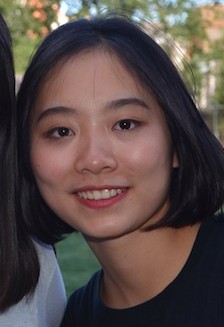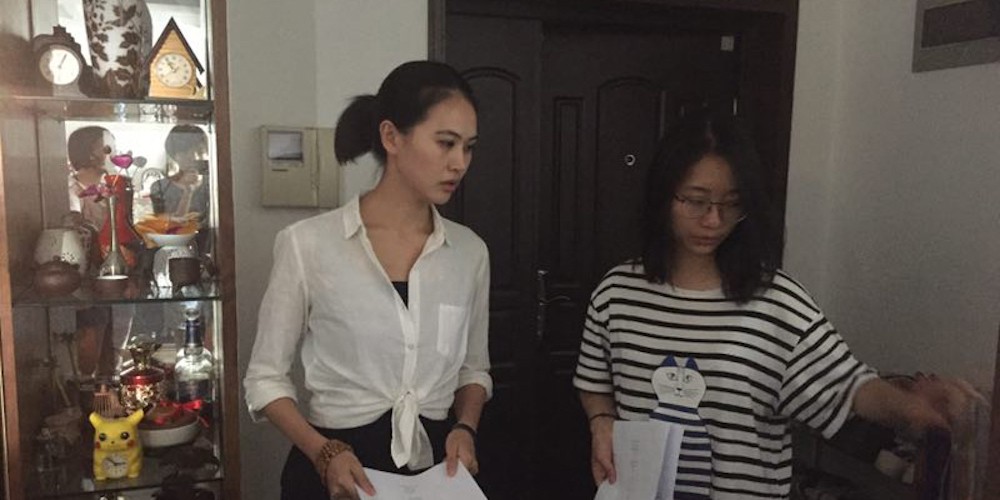Meet the Makers: Chengzhi Jin
Meet the Makers is an ongoing interview series highlighting current Columbia University School of the Arts Film Program students and faculty.

Chenzghi Jin is a producing student currently in pre-production for two narrative short films, scheduled to shoot this summer in China.
Where are you from and what's your background?
I come from China and obtained my college degree in English Literature with a concentration on Sociology from Beijing Foreign Studies University. I moved directly from undergrad to grad school. However, I got some experience from volunteer work at NGOs and internships in corporations.
What made you decide to pursue a graduate degree in film?
I participated in an exchange program between my undergrad school and Barnard College. The program sponsor people with scholarship to study in at Barnard for a full semester. Like other students at Barnard, we had the chance to take classes at Columbia and I happened to choose Film and Media Intro taught by the film program.
It was during that course that my love for cinema was aroused again. Under great influence from my father, I’ve been a cinephile somehow since middle school but never thought or felt that film could be a possible choice for career. One day, after watching Bicycle Thieves on the big screen in Dodge, I was astounded by a sort of sublime beauty that I thought: “I want to make stuff like this for the rest of my life.”
I applied for an internship near the end of my exchange period and got admitted by a production company named Enmaze which was based in Brooklyn and specialized in co-production between China and American. There, I produced my first short film, Coney and had some great experience working with filmmakers. The internship reinforced my faith to keep making films.
Why producing? What do you enjoy most about it?
I chose producing based on my undergrad experience. I didn’t have much experience in creative works and thus, wasn’t very sure if I had enough talent (still not sure now). However, I had some experience in supervising projects. For instance, as working for an NGO named “Bridging Education and Mobility” in China, I helped around 40 teachers from the rural parts of the country to apply for a small grant in order to improve their in-class teaching quality. I also gained experience in exhibition and production. After that, I thought producing was the right choice for my background.
Now what I enjoy about producing is, first of all, it’s like searching for a unicorn with the director that you have a basic idea or framework of what you are trying to make. Nobody’s ever seen a unicorn and the only way for you to find it is to trust your intuition that when you feel it’s there, it’s there. And it’s brand new for the world. Such experience means a lot to me cause I am actually making things that never existed before. I’m creating new stuff.
The other thing that attracted me to producing was meeting all kinds of people. My internship experience at corporations made me realize that most people spend their lives living within a small circle and only meet people around that circle. I always feel insufficient to limit myself to a certain area. I want to see more; I want to meet people beyond my life circle. I want to touch the reality other than living with my hallucination. And people in real life always interest me a lot. I’m so intrigued to find out their life path and how they become what they are. I’m never bored by humans. Producing throws me challenges that I’d never encounter in life if I choose something else as my career path and these challenges, for most of the time, are closely related to people. Therefore, the producing process is also my journey of human study. And I enjoy it a lot.
What was your biggest challenge in Columbia?
I think my biggest challenge is to “know thyself” and how to fit such self with what Columbia is trying to teach. We’ve been told that the best work is the most sincere work and your film will be the materialized version of your soul at the very beginning of our Columbia life, meaning, during the first year when professors in all classes were trying to help us find our voices. I also noticed, though, that there is a certain type of filmmaking that Columbia prefers or, say, would rather you to keep doing after finishing the courses here. I find what the school teaches is super helpful. However, my expectations for my future films don’t really fit into the Columbia aesthetics for good works. Therefore, I’ve been struggling with how to get the most out of the program while still having a self. How much self should I preserve during my stay here?
What are you currently working on?
I’m currently working with two of my classmates on their second year films. Both films will be done in China this summer. I’m also working on the feature script I wrote in my screenwriting class as a second year. Most ideally, the revised version could be done by the coming September so that I can take the script to my revision class. I just came up with an idea of rewriting Mikio Naruse’s Floating Clouds, but from a female perspective, and I would like to try to write a bit over the summer as preparation for the future screenplay. As I’ve discovered my interest and pleasure in writing, I’m also trying to write and publish some short stories. I would be happy to share with people my work if anyone is interested!
What kind of a filmmaker do you want to be in future? What stories do you want to tell?
I am very interested in the ambiguous boundary in human relations and I want to explore that more. As a female filmmaker, my major interest, more or less, lies in women and their predicament in the society they live in. Sometimes, such an interest would appear in a form of telling purely male stories. Anyway, my works always involves ordinary people and their living situations, with some surreal/cinematic elements. I’d summarize my interests in film as “dreams that resemble life.”
As for my career plan, I am trying hard to be a producer/screenwriter in the future. It would be great if I could always have my own story produced, but it’s also fun to work with directors with different, sometimes, polarized approaches to film.
